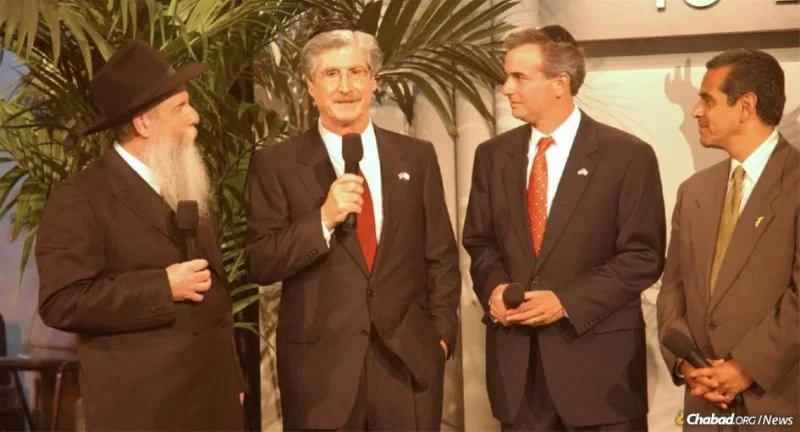
Marshall B. Grossman, 84, a ‘Tough Lawyer With a Soft Heart’
by Noa Amouyal – chabad.org
In powerful Hollywood circles, Marshall B. Grossman was known as a consummate litigator who represented clients like Steven Spielberg, Clint Eastwood and J.K. Rowling, and corporations like Apple, Blockbuster and Netflix.
Grossman, who passed away in October at the age of 84 after a 10-year battle with Parkinson’s disease, was a no-holds-barred lawyer who litigated the first successful consumer class action in California.
But to Rabbi Boruch Shlomo Cunin, director of West Coast Chabad-Lubavitch, Grossman was “like a brother.” “He’d always say, ‘Whatever you need, I’m here for you.’ And he meant it,” Cunin told Chabad.org.
Grossman was a dedicated advocate for the Jewish people, and a supporter of Chabad in California and around the world. He served as the co-chair of the annual Chabad Telethon for many years and was a generous participant in Chabad efforts, including the effort to return the library of the Sixth Rebbe—Rabbi Yosef Yitzchak Schneersohn, of righteous memory.
Born on March 24, 1939, in Omaha, Neb., Grossman’s family moved to Los Angeles when he was 4 years old after his father was named director of the Hollywood USO, which brought top entertainers to U.S. military bases around the world during World War II.
Grossman recalled in a 2010 interview with Super Lawyers magazine that his family was denied an apartment because they were Jewish. “It’s one of the first things I remember,” he said.
After graduating from the University of Southern California Law School in 1964, he discovered that Jews were not welcome at many of the city’s biggest law firms, and he went to work at Weber, Schwartz & Alschuler, a small boutique law firm in Beverly Hills, where he began a string of successful litigations. In 1973, he was a co-founder of the Association of Business Trial Lawyers. Profiled in “The Best Lawyers in America,” Marshall was twice selected by the National Law Journal as one of the top ten trial lawyers in the country.
“If you ever met Marshall, you would realize he was a force of nature,” retired Los Angeles Superior Court Judge Burt T. Pines told the Los Angeles Daily Journal. “He had the rare combination of raw intelligence, oral skill, knowledge of law and the ability to think outside the box.”

A Champion of Jewish Causes
As a young lawyer, Grossman developed an immediate bond with Rabbi Cunin in the mid-1960s, when Grossman’s wife, Marlene, saw the young rabbi deliver a speech to a young leadership group at the Jewish Federation. The Rebbe—Menachem M. Schneerson, of righteous memory—had recently sent Cunin to be an emissary in California, and the Grossmans struck up a friendship with the rabbi.
“As he got more involved with Chabad, he’d put on tefillin with me,” recalled Cunin. “Our relationship blossomed in an incredible way. He was influenced by the Rebbe’s teachings and personal example, and I think that’s what motivated him to be such a dedicated member of our community.”
“He was a fiery attorney on one hand, very tough,” said Cunin, but had a softer, humble side that he showed outside the courtroom. The rabbi recalled how Grossman would ensure that every attendee at services had a siddur in hand, and whenever he spotted an elderly man during services he would ensure that he was given a seat. He would host lunch-hour Torah classes for attorneys in his firms, as well as Megillah readings and festive parties on Purim.
‘Help Get Back the Texts’
Throughout his life, Grossman was committed to Jewish causes. Over a number of decades, he donated substantial time and expertise to assist Agudas Chassidei Chabad—the umbrella organization of the Chabad-Lubavitch movement—in a lawsuit against the Russian Federation to retrieve sacred religious books belonging to the Sixth Rebbe that were confiscated by the Russian and German governments during the Bolshevik Revolution and the Holocaust.
“His friendship became clear to me when the Rebbe enlisted me to help get back the texts,” Cunin recalled.
A champion for dissidents from the Soviet Union, Grossman took on the task of retrieving the books as a personal mission. As a partner at Alschuler Grossman Stein and Kahan, he worked tirelessly on both fronts and did so pro bono. The library, which totals 12,000 volumes and 50,000 rare documents, followed the Sixth Rebbe out of Russia when the Soviets expelled him in 1927. They were left in Poland when the Rebbe went to the United States at the beginning of World War II. The Nazi army seized the collection, but it was recovered by the Soviet Army in 1945 at the close of World War II.

Manuscripts in the collection included Soviet government papers granting the Sixth Rebbe permission to leave the USSR, as well as documentation proving the Red Army stole the archive from the German Gestapo as a “trophy.”
“He spearheaded those cases and walked us through those first critical moments,” Cunin recalled with awe.
In 2005, Grossman described the historical significance of the case, saying: “The testimony and documents required to be produced provide a rare and unprecedented unveiling of the persecution of Chabad leadership at the hands of the former Soviet Union.”
“He had so much love and care for his family, for every Jew and for every detail of Chabad,” said Cunin.
Grossman is survived by his wife, Marlene; their children, Rodger and Leslie; grandchildren Sofia, Goldie and Max; his sister, Phyllis Ruben, and her family; and a large extended family.












